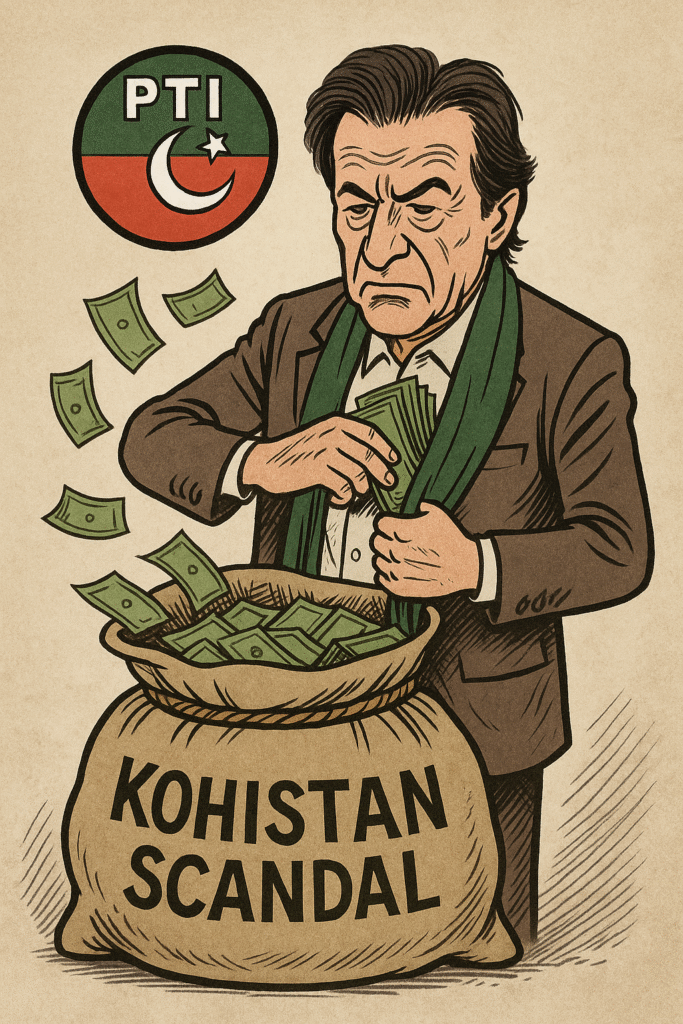When the Guardians Pillage the Treasury
PTI and the Kohistan Collapse

In 2013, a new political force entered the corridors of power in Khyber Pakhtunkhwa (KPK), carried by a wave of public discontent and hope. Pakistan Tehreek-e-Insaf (PTI), led by Imran Khan, promised to uproot entrenched corruption, overhaul governance, and restore dignity to the republic. The slogans of insaf, tabdeeli, and clean governance resonated across the province. For many, it felt like the beginning of a moral transformation.
Twelve years later, that promise lies in ruins. The Rs 40 billion Kohistan scandal, emerging under PTI’s own watch, represents not just administrative failure—it signals a collapse of moral and political integrity.
According to the National Accountability Bureau (NAB), massive embezzlement occurred between 2018 and 2024 in Upper Kohistan, with public development funds siphoned off through fake cheques, ghost projects, and bank collusion. Over Rs 25 billion worth of assets has already been recovered: luxury vehicles, gold bars, plazas, and bank accounts frozen across multiple districts.
More troubling is the involvement of prominent political figures. Former PTI senator Azam Swati has been summoned over suspicious transactions exceeding Rs 300 million. One arrested contractor is reported to have used looted funds to purchase Swati’s residence.
“The worst form of injustice is pretended justice.”— Plato
The Kohistan scandal reveals not merely a breach of accountability — but a breach of trust in a party that claimed to be morally exceptional. This is not a minor administrative hiccup. This is a philosophical collapse.
A Crisis of Political Culture
PTI positioned itself as the antithesis of dynastic politics and rent-seeking elites. Yet Kohistan exposes how quickly revolutionary fervor can be consumed by the very system it promised to reform. Just as striking is the collective denial from party loyalists — a refusal to believe, even in the face of bank receipts, frozen assets, and criminal arrests.
"It is difficult to free fools from the chains they revere."— Voltaire
When governance becomes myth and leadership becomes messianic, accountability dies. The public rationalizes:
“He didn’t know.”
“He was betrayed by others.”
“It’s all a conspiracy.”
But leadership without responsibility is not leadership — it is performance.
"Those who can make you believe absurdities, can make you commit atrocities."— Voltaire
A National Illness, Not Just a Party Problem
Let us be clear: PTI is not alone in its failings. What happened in Kohistan could have happened — and has happened — under every major political party in Pakistan. Corruption is not merely a crime in this land; it is a cultural inheritance.
"Every nation gets the government it deserves."— Joseph de Maistre
If the same culture of impunity repeats across parties, then we must admit the truth: the system is not broken — it is working exactly as designed.
"The accomplice to the crime of corruption is frequently our own indifference."— Bess Myerson
Will the Voter Remember?
Let’s not delude ourselves. PTI will still win votes in the next election — perhaps even a majority. Because politics in Pakistan is no longer transactional; it is tribal. Support is based not on performance but identity, not on evidence but emotion.
“The fault, dear Brutus, is not in our stars, but in ourselves.”— William Shakespeare
This is why accountability often fails. The political class does not fear the law; they count on the public's short memory.
The Death of Innocence
The Kohistan scandal should mark the end of moral innocence in Pakistani politics. If even the party of “change” indulges in the same corruption, then no slogan remains unsoiled. No flag remains stainless. What dies in Kohistan is not just Rs 40 billion worth of public trust — it is the last illusion of ideological purity in modern Pakistan.
"Man is not what he thinks he is, he is what he hides."— André Malraux
To those who still believe that political saviors exist, that the next leader will be “different,” let Kohistan serve as a reminder: the only difference is the speechwriter.
"He who allows oppression, shares the crime."— Desiderius Erasmus
A Call to Conscience
This moment demands more than headlines. It demands reckoning.
"The only thing necessary for the triumph of evil is for good men to do nothing."— attributed to Edmund Burke
If this scandal fades without consequences — if those who stole from the poorest remain in power, protected by the blind allegiance of voters — then we as a nation must stop asking “Who did this to us?” and start asking “Why do we let them?”
Because silence is not neutrality.
"We are not ruled by tyrants because they are powerful; we are ruled by tyrants because we are silent."— Unknown
Want to read more?
Post a comment Cancel reply
You must be logged in to post a comment.
Related Posts
The Ban, the Bridge, and the Bargain: Pakistan’s Sudden Return to the Limelight
U.S. terror designations, KP operations, and back-to-back White House outreach signal a transactional reset with…
We Were Chosen And We Failed
We Were Chosen And We Failed The world today is not merely in chaos —…
The Death of Europe’s Soul
The Death of Europe’s Soul Why the Elites Crave “One People” “A Breton is not…
The Middle Path to Hell
The Middle Path to Hell A lament on the failure of justice, the corruption of…




